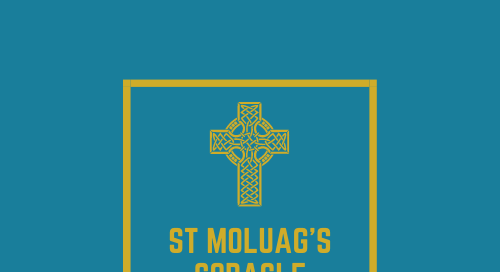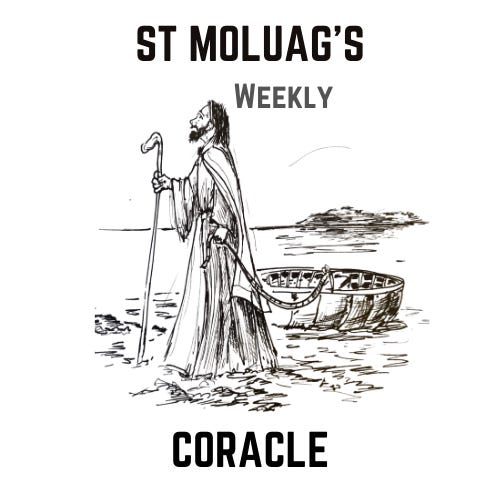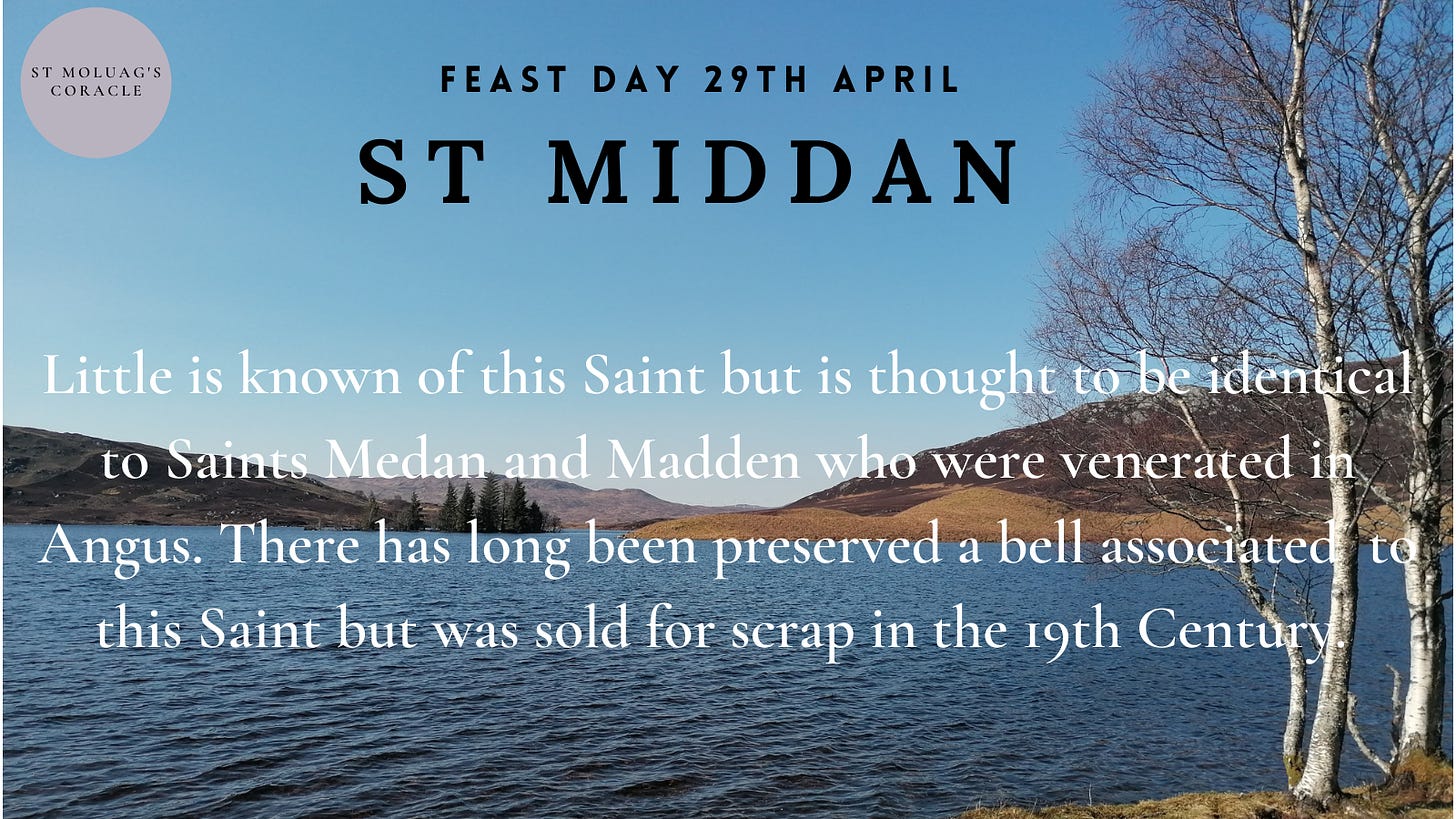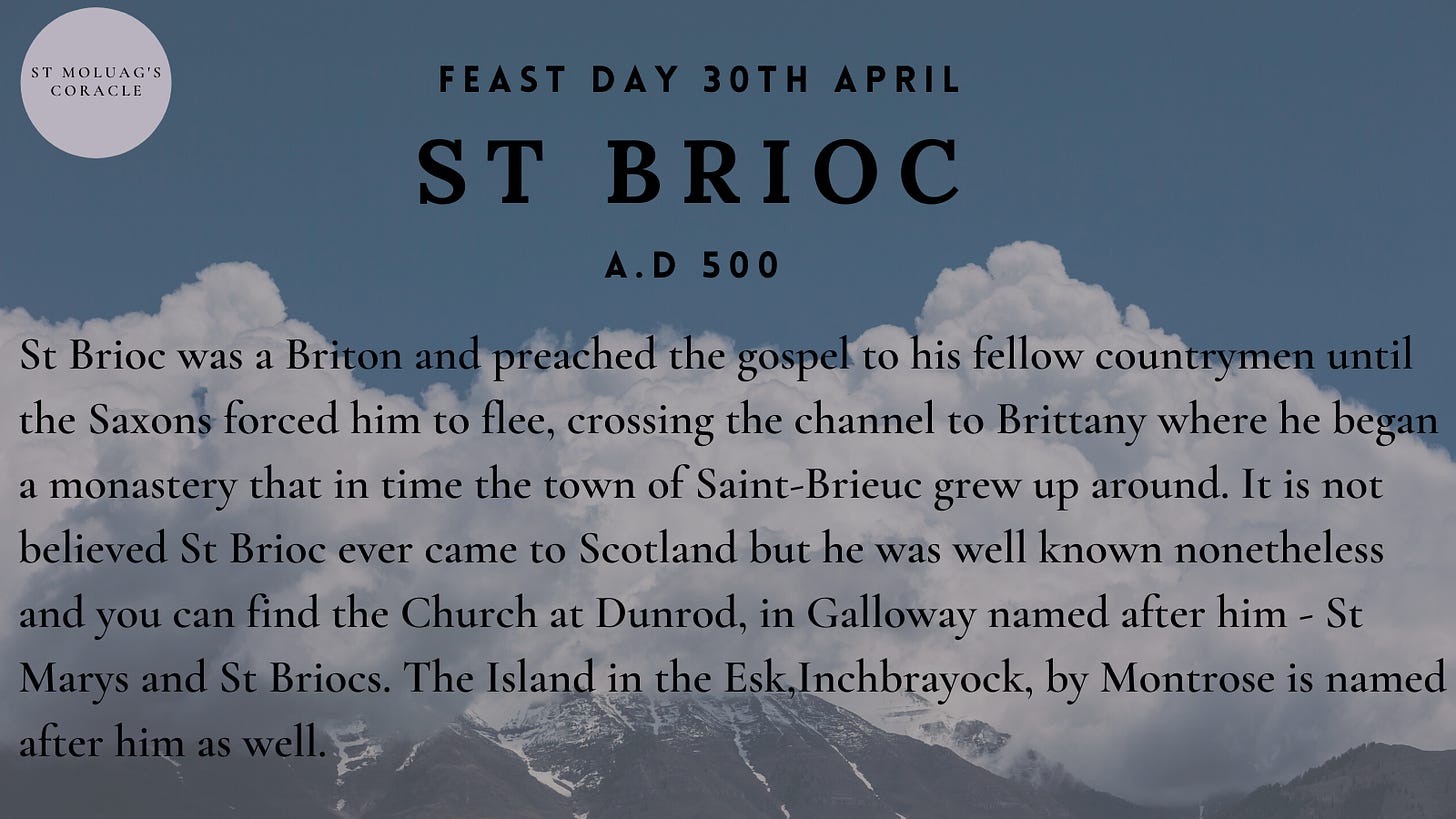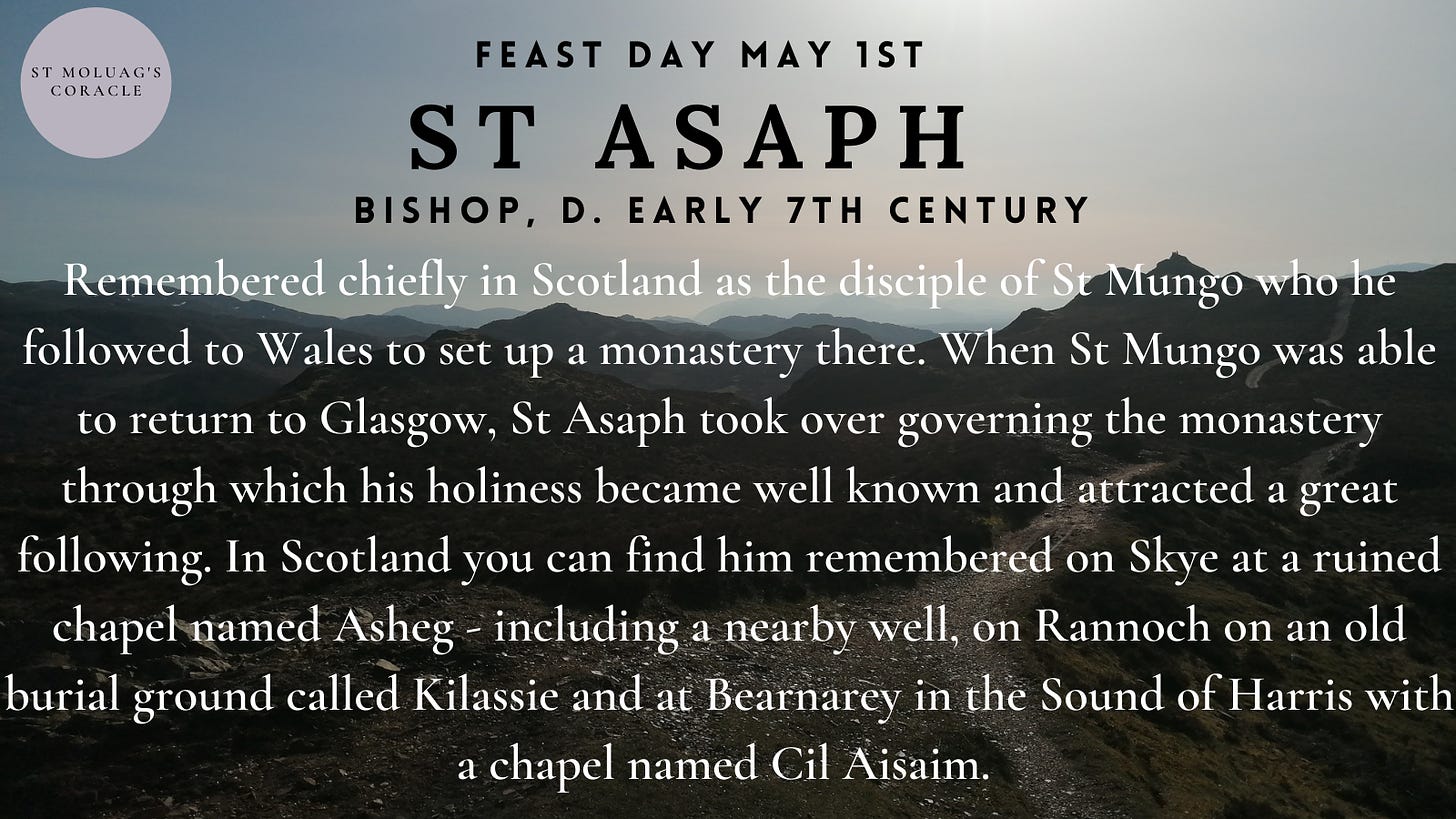Of Unicorns and Kings: An Election Special
In the run up to the Holyrood Election we look at how we as Catholics could think about, and engage with, Scotland's modern political scene.
This week’s Coracle is going to be slightly different, with the Holyrood 2021 Elections happening on the 6th I felt it was important that we have a look at how we as Catholics can interact with Scottish Politics and this Election in particular. However, just to stress, this publication will never side with one particular party or tell you who we think you should vote for. The 3 writers contributing to this each have differing political opinions and allegiances but are committed Catholics who regularly engage their faith in the public square. You will also find on this page a link to the Catholic Parliamentary Office’s guide on voting. Finally, when considering our vote on the 6th of May, let’s bear in mind St Augustine’s words on the nature of humanity as he wrote in the City Of God.
“The bodies of irrational animals are bent toward the ground, whereas man was made to walk erect with his eyes on heaven, as though to remind him to keep his thoughts on things above.”
Written by James Bundy
Scottish politics is greatly divided after nearly 15 years of constant debate on Scotland’s constitutional standing. Rather than focusing on improving the education of the youth and healthcare of the eldery, we have become obsessed with flags and identity. Both sides of the constitutional debate are guilty of this. Who has the bigger saltire or union flag has replaced the fundamental questions politics should be focused on.
Catholics engaging with Scottish politics should seek to overcome these divisions. One should not abandon principled positions held on the constitution, but put their energies behind policies and causes which protect and enhance human life. We also need to give a voice to those who need support to be heard.
In 2019, more than 1,200 of our fellow Scots died of drug misuse, double the 2014 figure, resulting in Scotland’s being given the title: “Drug death capital of Europe''.
The Child Poverty Action Group have forecasted that without significant legislative change the Scottish child poverty rate will be 29% by 2023-24, the highest rate for over 20 years.
During the Coronavirus pandemic, around a third of Scottish Covid deaths were in Care Homes, with the Scottish Government admitting they did not have a true grasp of the needs of social care throughout the pandemic. Social Care reform has long been promised, but we have seen no serious efforts to actually bring this to fruition.
The gap between rich and poor in education is still far too big, with the pandemic likely increasing the size of this gap. Far too many children are having their future shaped by their postcode, not by themselves.
In his papal encyclical caritas in veritate, Pope Benedict XVI writes: “Truth needs to be sought, found and expressed within the ‘economy’ of charity, but charity in its turn needs to be understood, confirmed and practised in the light of truth.”
True charity is to receive and give love, supplied to us by the Blessed Trinity. It calls us to seek justice for our neighbours, and search for the common good. What is good for my neighbour and wider society should be the questions that motivate Catholics in public life.
For charity to be liberating, however, it must be soaked in truth of faith and reason. Pope Benedict describes charity without truth a “pool of good sentiments”. When advocating, developing and debating policy, Catholics must ask themselves if the truth of our faith and of reason have shaped it.
In Fratelli Tutti, Pope Francis writes: “Only the man who approaches others, not to draw them into his own life, but to help them become ever more fully themselves, can truly be called a father”.
In public life, we have a responsibility not to focus on statistics or identities, but the people and society behind them. What are we doing to protect and empower individuals, families and communities? What are we doing to see their neighbour as a human being who may need help, rather than a Unionist or a Nationalist? Are we listening to those suffering from current injustices the most?
Catholic engagement in public life needs to be courageous. We should be seeking to build bridges in areas that are filled with division. We should be as happy to work with people in other political parties as our own if that means bringing about the common good. When fatally flawed policies are being pursued by the Government, we should be prepared to ask the difficult questions that need to be asked. All of these are extremely daunting for most people.
For those of faith, however, it is our calling. As long as we are motivated by Charity steeped in Truth, our Lord will be guiding us in our actions and our words. Trust the Lord, and let Him guide us all.
Image: "Franciscan Triptych" by Lawrence OP is licensed under CC BY-NC-ND 2.0
The Social Kingship of Christ in Scotland
Written By Jamie McGowan
May realms and they that rule them vie
With solemn rite to raise Thee high;
May laws and arts Thy servants be,
All life be sanctified in Thee
(Vespers Hymn, Feast of Christ the King
The ‘Social Kingship of Jesus Christ’ has been oft cited as a model of political life over the last century, with Pius XI declaring that each nation must “recognise, both in private and in public life, that Christ is King”. Only then will society know the “great blessings of real liberty, well-ordered discipline, peace and harmony”. The concept is rather simple; Jesus Christ calls us not only to the conversion of our own hearts, but also to the conversion of our political institutions.
Scots should not be unfamiliar with the ties between the Kingship of Christ and the Kingship of Scotland. The Scottish Royal Arms which can be seen frequently in Edinburgh show ‘The Unicorn and The Crown’ linked by a chain. Some campaigners for independence have tried to re-paint this image to represent the oppression of English rule, where Scotland, represented by the Unicorn, is unjustly chained to the crown and must be freed from captivity. However, this imagery is a total nonsense.
The Unicorn represents Jesus Christ. On a quick trip to Stirling Castle, one discovers how the fable of the Unicorn Hunt represents the Passion, Death, and Resurrection of Christ. Humanity is represented by the hunters, plagued by sin and the fall, who originally watch the omnipotent unicorn in awe. However, out of envy, the hunters eventually launch a brutal attack on the unicorn, slaughtering him and entombing him in a castle. But the unicorn rises from the dead, since he is more powerful than death itself. He then lives forever in the garden – the garden of Heaven – where he is tied to the pomegranate tree, which is a symbol of fertility and marriage. This, of course, represents beautifully the marriage of Christ to his Church; a marriage that is indissoluble, indestructible and bears the fruit of salvation – fruit that will last.
It was no mistake that the Scottish Kings used the same nuptial imagery in their royal arms. In the political theology of the Church, the ruler of a state was always understood to be a shepherd of sorts. As St Thomas Aquinas puts it, a true ruler is “a shepherd, seeking the common good of the multitude and not his own.” This is why the Scottish coronation rite was always sort of episcopal in its nature, charging the King of Scots with the good of his flock, that he lead them to the common good on earth and ultimately to the beatitude of heaven. The Christian state was then understood not to be separate from the Church, but a constituent part of the Church, which looked after worldly affairs with a view to facilitating both the life of virtue and the liberty of Holy Church. Thus, the chain between Christ the Unicorn and the Scots Crown also represents the Marriage of Jesus Christ to the Church, but with an emphasis on the Church temporal, the Christian state, of which the King of Scots had charge.
Alas, this symbolism, beautiful thought it may be, is totally foreign to the modern state. The state’s priority is no longer the salvation of souls, nor even is it the life of virtue. As Alasdair MacIntyre once quipped, pledging obedience to the modern nation state is tantamount to pledging obedience to the telephone company. Why? Because politics in the modern day has become an exercise in mere utility. Rather than facilitating a life of virtue and common happiness, the modern state is concerned with only a functional existence, focusing on either economic growth or basic provisions. Sadly, too often one of those is sacrificed for the other, meanwhile any talk of morality is disregarded as irrelevant.
For the Catholic in modern Scotland, one sees no evidence of any shepherd-like understanding of government. Instead, utility takes an alarming priority over virtue. There are two attitudes we can have to this sorry state of affairs: the first is that we will never be able to recover a pastoral idea of government; the second is that we have a lot of work to do. I much prefer the latter.
The question is: where do we even start? In the upcoming Holyrood elections, there is no mainstream party which we can truly deem favourable. While the fiscal policies of each parties will vary, their attitude to social liberalism – Tory, SNP, or Labour – is practically unanimous. It basically boils down to a question of which flag you prefer, and then whether you prefer more or less government.
Hot-button issues will be a big problem in the next parliament. Three parties have pledged to begin talks about Assisted Suicide legislation. Two parties have made a manifesto commitment to abortion rights. Astonishingly, no mainstream party has made any manifesto commitment to religious freedom. Some Catholics feel like they have to vote for completely unelectable groups just to vote in line with their conscience. The result? Our conscience might be satisfied; but ultimately no meaningful advance is made toward the Christianisation of our political institutions. That is unspeakably problematic.
We have created this ‘telephone company’ problem entirely by ourselves. Every day I hear Catholics complaining that there are no honest politicians for whom we could vote in good conscience. This is true to an extent – not one Scottish politician is carrying the banner for Catholic Social Teaching.
Is that the fault of the political class or is it our own fault? Catholics are too afraid to get stuck into the political realm in Scotland. We are in this situation today because of decades of retreat from political institutions and political parties, all because we were hesitant to be associated with groups which hold some unorthodox views. Certainly, there is prudence in knowing when to change our party allegiances; but there is no courage in complete and total desertion from the political battlefield.
Instead, we incessantly complain about our candidates. We enjoy the safety of our ‘benedict option’, naïvely thinking that it will work out in the end if we keep to ourselves, meanwhile Scotland falls around us. Is that the virtue of patriotism? Is that caring for the common good which cares for us? A puritanical attitude to political life is developing in Catholic Scotland which is contrary to the vision of the Church.
For Catholics, the common good, not our own individual good, is the hinge upon which every legal, economic, or political question turns. If we are to inject a love for Scotland’s ‘commonweal’ into our political process, we have to make a much greater effort. The Second Vatican Council teaches us that is the duty of the laity to “penetrate and perfect the temporal order”. It is high time we live up to that apostolic calling.
Hopefully this election will be a lesson to us. We have to join electable parties; compromising where we can, and holding firm where we cannot. ‘Hagan lío’; the Holy Father tells us, ‘make a mess’. If the Church is to be a ‘field hospital’, then we must get involved in political battles, taking refuge in the safety of the Sacraments and Sacred Doctrine. Whether we like it or not, politics will always be about personalities. The political animal cares far more about who is on the ballot than what is there. We would do well to have some more politicians who are not only well-formed in social teaching, but also lead a life of prayer and virtue, nurtured by true Christian charity and daily devotion to the Holy Eucharist.
My challenge to each reader is simply this: why are you not a member of a political party? What could you do to bring about the Social Kingship of Jesus Christ in Scotland? Unless we have the courage to answer those questions and engage in the political realm, we run a real risk of severing that chain between Unicorn and Crown. Going forward, let us do everything we can to put Jesus Christ at the forefront of public life.
The Dialectics of Secularization: On Irrationality and Religion
Written by Ruairidh MacLennan
In 2004 two renowned German academics presented their arguments in a debate called “The Dialectics of Secularization: On Reason and Religion”. In giving the critical theorist Jürgen Habermas and the then prefect of the Congregation for the Doctrine of the Faith, Cardinal Joseph Ratzinger, opportunities to speak on the subject, the conversation was one between two very different interlocutors.
Though both men are profoundly, indeed personally, conscious of the dangers of dogmatism in the political realm - as well as of the complexities of societies with competing ideologies – the pair’s extensive works map out what appear to be parallel paths to averting political or societal disaster.
For the political theorist Habermas, communication and political legitimacy are fundamental to ensuring the place of ‘reason’ in establishing and then maintaining right order. Nevertheless, Habermas offers a caveat to his initial principle: “I assume that the constitution of the liberal state can satisfy its own need for legitimacy in a self-sufficient manner, that is, on the basis of the cognitive elements of a stock of arguments that are independent of religious and metaphysical traditions. Even under these presuppositions, however, a doubt remains with regard to the question of motivation.” Even to the most ‘religiously tone-deaf’ of theorists, self-sufficiency in the political realm does not equate with philosophical self-justification.
For Ratzinger, truth as revealed by revelation shines a light on a path to human flourishing. Revelation contextualises both ‘reason’ and ‘religion’ in a way that makes it appropriate to ask: “Should perhaps reason and religion restrict each other and remind each other where their limits are, thereby encouraging a positive path?” Reason and religion need not be competitors, but complementary forces in an ever more complex political sphere. Nevertheless, both men underline the role which reason must play in ensuring fruitful coexistence in pluralistic societies. Reason acts as a guarantor against an unhealthy dogmatism, religious or irreligious.
It must be noted however, that ‘reason’ as it is referred to in this fascinating debate rests on a western notion of the word. ‘Reason’, or Vernunft, as it understood here is not something found in most politically charged times and places. Indeed, it is not a constituent part of the majority of political realities that most societies have known, in Europe or elsewhere. Even in the contemporary west, ‘reason’ may be seen to be a concept which carries less political and philosophical capital than it did as recently as 2004. One might anecdotally observe, that today’s political ideologies rest less on reason, than they do on irrationality.
As Habermas admits in slightly different terms, reason acts as a guarantor of the good insofar as it does not conflict with the ends of narrative. Since time immemorial, it is irrationality rather than reason which reigns supreme if the crowd so desires. At this point it is helpful to return to scripture. St Matthew’s gospel describes how the crowds chanted for the release of the criminal Barrab’bas and the execution of the innocent Christ:
“Now the chief priests and the elders persuaded the people to ask for Barab′bas and destroy Jesus. The governor again said to them, “Which of the two do you want me to release for you?” And they said, “Barab′bas.” Pilate said to them, “Then what shall I do with Jesus who is called Christ?” They all said, “Let him be crucified.” And he said, “Why, what evil has he done?” But they shouted all the more, “Let him be crucified.” (Mt 27:20-23).
In the febrile atmosphere of Jerusalem, it was not reason but its absence that led the crowds to chant for an act of gross injustice. It was not reason, but narrative that dictated it must be so. Justice, charity and even truth itself can be cast aside if the impulses of irrationality take hold in a time of tribal loyalties and unrestrained passions. In our time as much as that of Christ, however, narrative rather than reason is at the centre of all that we do.
History, both ancient and contemporary, offers countless examples of political means being justified by political ends, insofar as the conclusion to a preferred narrative arc is satisfactory. While Habermas and Ratzinger debated each other on the interplay of reason and religion at a time when reason was central in justifying any intellectual exercise, what emerges from their conversation is equally relevant to a time when it is narrative, emotivism and irrationality that dominate discourse.
Habermas offers a useful principle for rational as well as irrational times: ‘The starting point for the philosophical discussion about reason and revelation is a recurrent idea; namely, namely that when reason reflects on its deepest foundations, it discovers that it owes its origin to something else.’ In other words, reason as it is commonly understood does not contain within itself the capacity to justify its own necessity. Similarly, reason cannot on its own prevent an irrational impulse from directing the actions of individuals and societies.
What is needed then – in politically charged times most of all – is the light and the clarity of faith. It is faith that informs reason and so elevates it. As Cardinal Ratzinger said to his secular interlocutor those years ago: “The essential values and norms that are in some way known or sensed by all men will take on a new brightness in such a process, so that that which holds the world together can once again become an effective force in mankind.” It is faith that frees the individual from the passions and prejudices of crowds – be they in ancient Jerusalem or in our own time and place. In surrendering to the light of faith, we elevate our capacity for reason and dull our senses to irrationality. In times of political and societal irrationality – to which no-one is immune - perhaps we are called to be faithful first of all.
Image: "A political parallel"by Boston Public Library is licensed under CC BY 2.0
Our Writers:
Ruairidh is a Glasgow based journalist who also writes for us on a variety of topics and has his own blog. Jamie is based at the University of Glasgow researching Constitutional law and writes on Scots law and other similar subject. James works for Freedom Declared Foundation, a passionate Conservative and author of the excellent series Catholicism and The Making of Modern Britain over on The Crombie Burn Reader.
Here is the link to the Catholic Parliamentary Office in Holyrood who have done a great deal of work to help us think through the issues and candidates in this election. Go here for more info.
St Middan, St Brioc and St Asaph.
St Brioc and St Asaph are not to believed to have ever visited Scotland but their holiness and reputaton was known in Scotland and as such had Churches and and Island named after them. Once again attesting to the wide-spread believe in Scotland to the Communion of the Saints.
God Bless from Eric and the Team

